On the tarmac of a Moscow airport in late August, Yevgeny Prigozhin waited on his Embraer Legacy 600 for a safety check to finish before it could take off. The mercenary army chief was headed home to St. Petersburg with nine others onboard. Through the delay, no one inside the cabin noticed the small explosive device slipped under the wing.
When the jet finally left, it climbed for about 30 minutes to 28,000 feet, before the wing blew apart, sending the aircraft spiraling to the ground. All 10 people were killed, including Prigozhin, the owner of the Wagner paramilitary group.
The assassination of the warlord was two months in the making and approved by Russian President Vladimir Putin’s oldest ally and confidant, an ex-spy named Nikolai Patrushev, according to Western intelligence officials and a former Russian intelligence officer. The role of Patrushev as the driver of the plan to kill Prigozhin hasn’t been previously reported.
The Kremlin has denied involvement in Prigozhin’s death, and Putin offered the closest thing to an official explanation for the plane’s fiery crash, suggesting a hand grenade had detonated onboard.
None of that was true.
Hours after the incident, a European involved in intelligence gathering who maintained a backchannel of communication with the Kremlin and saw news of the crash asked an official there what had happened.
“He had to be removed,” the Kremlin official responded without hesitation.
ADVERTISEMENT
With tens of thousands of troops and lucrative gold, timber and diamond operations in Africa, Prigozhin managed a multibillion-dollar empire overseas. But back in Russia and on the battlefield in Ukraine, his public confrontations with the military’s top brass over weapons and supplies had put him on a collision course with the Kremlin.
When that boiled over into an outright mutiny in late June against Russia’s military commanders—with an armed march on Moscow by some of Wagner’s 25,000 fighters and tanks—Patrushev stepped in to ward off the biggest challenge yet to Putin’s more than two-decade rule. He also saw an opportunity to eliminate Prigozhin for good.
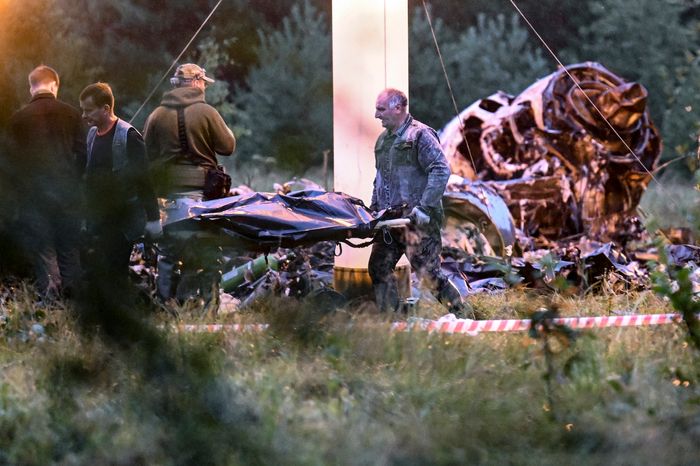 The wreckage of the crashed private jet that carried Prigozhin. PHOTO: ASSOCIATED PRESS
The wreckage of the crashed private jet that carried Prigozhin. PHOTO: ASSOCIATED PRESS
In interviews with Western intelligence agencies, former U.S. and Russian security and intelligence officials, and former Kremlin officials, The Wall Street Journal unearthed new details about the mutiny and murder of Russia’s most powerful warlord and the previously unknown role of Patrushev in reasserting Putin’s authority over an increasingly unstable Russia.
Through the power of state-controlled media and his own persona, Putin has unsettled the West with his image as a determined adversary who rules Russia alone. In fact, he is kept in power by a vast bureaucracy that has proven durable through deepening hostilities with the West and rising domestic divisions over the botched invasion of Ukraine.
Controlling the levers of that machine is Patrushev. He has climbed to the top by interpreting Putin’s policies and carrying out his orders. Throughout Putin’s reign, he has expanded Russia’s security services and terrorized its enemies with assassinations at home and abroad. More recently his profile has grown, backing Russia’s invasion, and his son Dmitry, a former banker, has been appointed agriculture minister and is touted by some as a potential successor to Putin.
ADVERTISEMENT
Patrushev’s handling of Prigozhin has helped Putin claim control ahead of the presidential elections next year.
Former colleagues of Patrushev describe him as a sober bureaucrat who, like Putin, spurns the media, relying on daily readouts about the world from Russia’s security services. Like Putin, he joined the spy services in the 1970s, and stuck with the service through the collapse of the Soviet Union when other officers flocked to more lucrative jobs in Russia’s nascent private sector.
Patrushev, 72, sees Russia locked in a struggle with the U.S., which he has said wants to steal Russia’s oil and minerals. He salts conspiracy theories into speeches and interviews. Earlier this year, he told Russia’s Izvestia newspaper that the U.S. is plotting to take over Russia because a massive volcanic eruption in Wyoming could soon make it uninhabitable.
His role in some of the darker chapters of Putin’s presidency underscores the often deadly consequences for anyone who falls afoul of the Kremlin.
Russian officials and Patrushev didn’t respond to requests for comment.
U.S. officials said soon after Prigozhin’s death that preliminary government assessments found the crash was the result of an assassination plot.
ADVERTISEMENT
Patrushev plunged into the world of spycraft at an early age in the Soviet city of Leningrad, now St. Petersburg. Recruited into the KGB after earning a degree in engineering, he attended the spy service’s academy in Minsk. He soon worked in counterespionage and as an officer responsible for security in a region bordering Finland.
With Putin, he suffered the collapse of the Soviet Union and the decline of the security services while the government of President Boris Yeltsin attempted to introduce Western-style economic reforms. When Yeltsin appointed Putin in 1999 to be prime minister, Putin recommended Patrushev as his replacement to lead the new version of the KGB, the FSB.
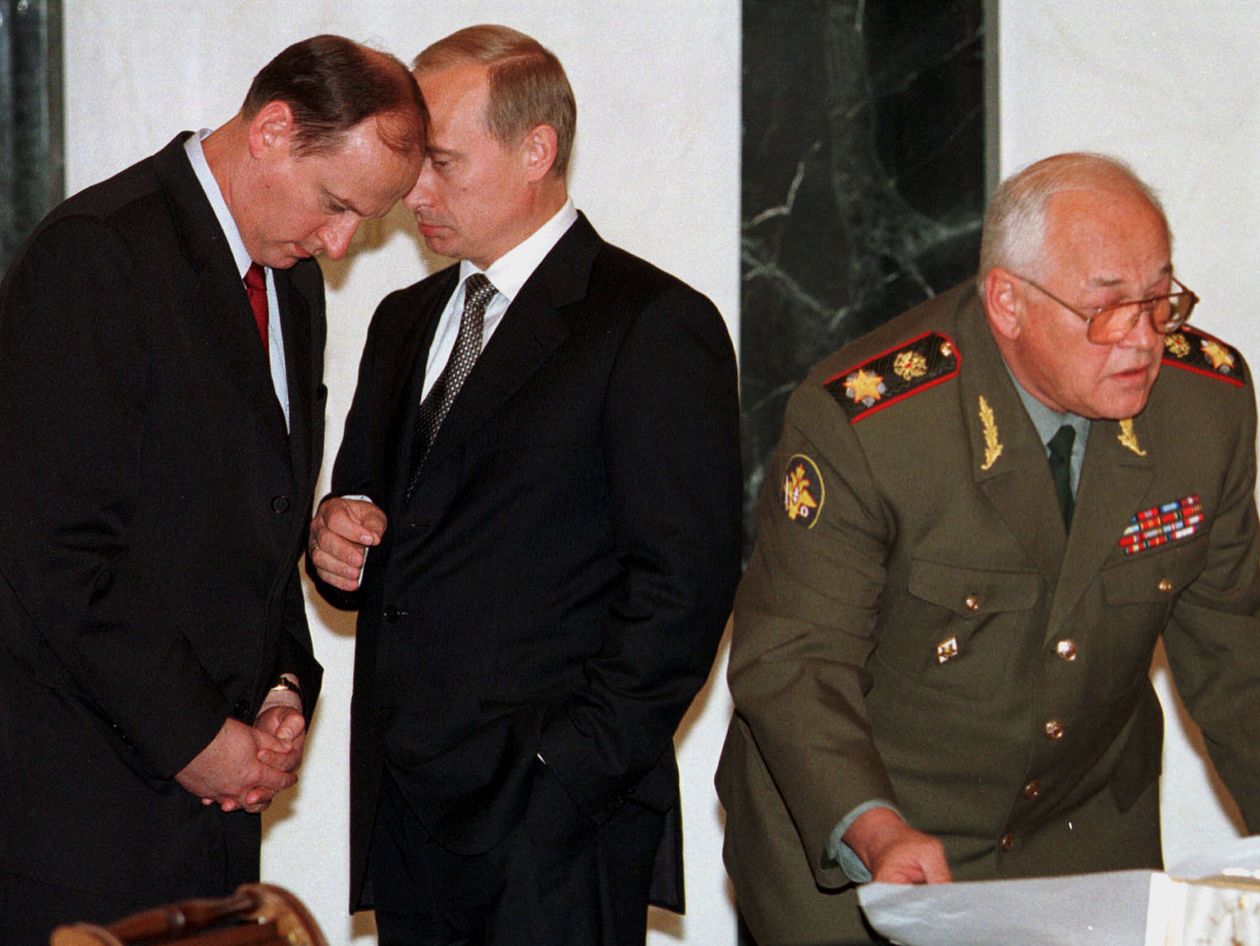 Putin, center, when he was prime minister, spoke to Patrushev, left, then head of the FSB, in 1999. PHOTO: REUTERS
Putin, center, when he was prime minister, spoke to Patrushev, left, then head of the FSB, in 1999. PHOTO: REUTERS
Putin’s rise to the presidency the following year buttressed Patrushev’s authority. The men were linked by common origins and convictions that only strong security services could make Russia strong.
As head of the spy agency, Patrushev began to reinvent the organization and referred to it in an interview at the time with the Russian newspaper Moskovsky Komsomolets as Russia’s “new nobility.”
It was a sensitive moment for the new president, and Patrushev showed he was ready to help. In his first year as president, Putin was threatened by revelations that he had served as an adviser to a real-estate company being investigated in Europe for money laundering. Patrushev traveled to Ukraine to take possession of damaging evidence from that country’s security service, according to audiotapes leaked from the Ukraine president’s office. Parts of the tapes were later verified by the U.S. government. Putin denied any wrongdoing, and the scandal later died down.
Patrushev soon signaled that traitors to the Kremlin would suffer. In 2006, Russia passed a law effectively legalizing extrajudicial killings of Russians abroad deemed terrorists or extremists. Months later, a former FSB agent, Alexander Litvinenko, who had fled to London and wrote about Putin and his own work as a spy, was killed by a dose of a radioactive substance in his tea. A British judge said that Patrushev probably approved the murder.
ADVERTISEMENT
As FSB director, Patrushev had hoped to foster cooperation with the West’s own antiterror efforts, which were then in full bloom in the U.S. after the attacks on New York and Washington in 2001. But Litvinenko’s poisoning, which contaminated a sushi restaurant in downtown London, began to sow questions about any cooperation. The assassination was one of the first of more mysterious killings of Russian émigrés in Europe and the Middle East that Western officials suspected were linked to Moscow.
When Russia convened an international counterterrorism conference in the city of Khabarovsk in 2007, the CIA declined to send any high-ranking officials, instead offering a lower-profile group headed by a former CIA station chief, Rolf Mowatt-Larssen. Mowatt-Larssen said Patrushev took him aside to say he was offended. “He said ‘Please take this message back to the CIA,’” Mowatt-Larssen said. “‘You aren’t taking us seriously.’”
In 2008, Putin promoted Patrushev to secretary of Russia’s national security council, a post that confers little formal power. But Patrushev’s personal gravitas, his proximity to Putin and his role as de facto head of its security services for more than two decades has made him the second most powerful person in Russia.
His new role also gave him the mandate to strengthen Russia’s ties abroad. Soon he was acting as a kind of hybrid intelligence official and diplomat, visiting some of the world’s most powerful leaders. The feverish pace of Patrushev’s travel schedule contrasted with how little was actually known about his meetings.
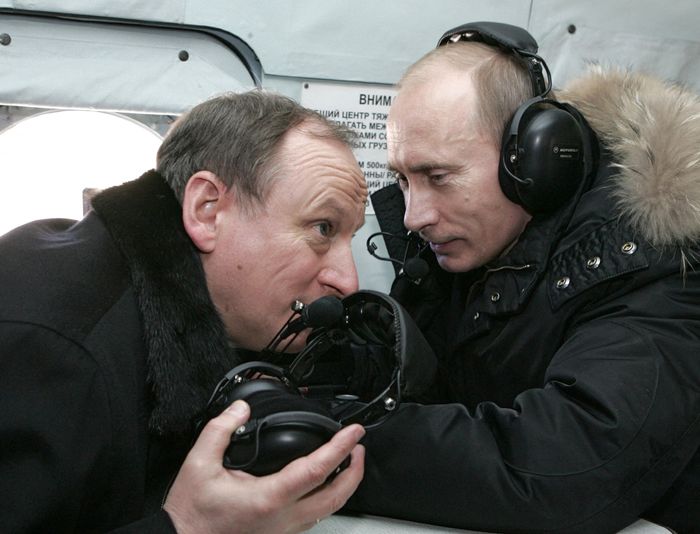 Patrushev and Putin on a helicopter to visit a military outpost in Nalchik, Russia, near Chechnya, in 2008. PHOTO: MIKHAIL KLIMENTYEV/RIA NOVOSTI/AFP/GETTY IMAGES
Patrushev and Putin on a helicopter to visit a military outpost in Nalchik, Russia, near Chechnya, in 2008. PHOTO: MIKHAIL KLIMENTYEV/RIA NOVOSTI/AFP/GETTY IMAGES
The operation, run from neighboring Serbia, failed, and the Russian agents were publicly exposed, causing fallout for Moscow’s allies in the region. Patrushev traveled to Serbia to reassure the government and brought the operatives home. Montenegro joined NATO a year later.
ADVERTISEMENT
Most of his work was done in the shadows. His plane was spotted in Oman in 2020 at the same time that Ukrainian President Volodymyr Zelensky was there, prompting accusations in Ukraine that the two had held a secret meeting. Both Zelensky and the Kremlin denied it.
Separately, in the run-up to Russia’s invasion of Ukraine, Patrushev’s plane also appeared in Jakarta at the same time as a visit by U.S. Secretary of State Antony Blinken, who was rolling out the White House strategy for regulating the contested Indian and Pacific Ocean region. The U.S. and Moscow each issued statements that no meeting took place.
Earlier, as indications grew of warming ties between Moscow and Beijing, the U.S. tried to talk the Kremlin back from an alliance with China. During the Trump administration, top White House officials met with Patrushev in Geneva to discuss prisoner exchanges and an extension of an arms control agreement.
A White House specialist on China, Matthew Pottinger, unveiled historical maps of Russian territories claimed by Beijing meant to underscore the threat China posed to Moscow. Patrushev listened patiently and then scoffed. “We know who our enemies are,” he said, according to one U.S. official who attended the meeting.
A former senior White House official said Patrushev has been a key conduit between Moscow and Beijing. “If Putin had been deposed or killed earlier this year by Wagner Group, I suspect Beijing would have made efforts to install Patrushev as Putin’s replacement,” the former official said.
John Bolton, who met with Patrushev numerous times as national security adviser to former President Donald Trump, said that Patrushev was always professional, never raising his voice in negotiations or showing much interest in small talk.
Bolton said he got a taste of anger only once, during a meeting in 2019, when their conversation turned to Ukraine. “We got a 20 minute oration about Ukraine and the history of it,” said Bolton. “It was very emotional and uncharacteristic for him.”
ADVERTISEMENT
Patrushev would become one the biggest defenders of the Ukraine invasion.
Russian expectations were disappointed in the first days of the conflict in February 2022. By the fall of last year, Russian forces were crumbling in the face of Ukrainian offensives in the south and north of the country, with tens of thousands of casualties.
The Kremlin called on Prigozhin and his Wagner fighters to buttress Russia’s failing war effort with his paramilitary group. Prigozhin’s rapid rise would soon worry Patrushev.
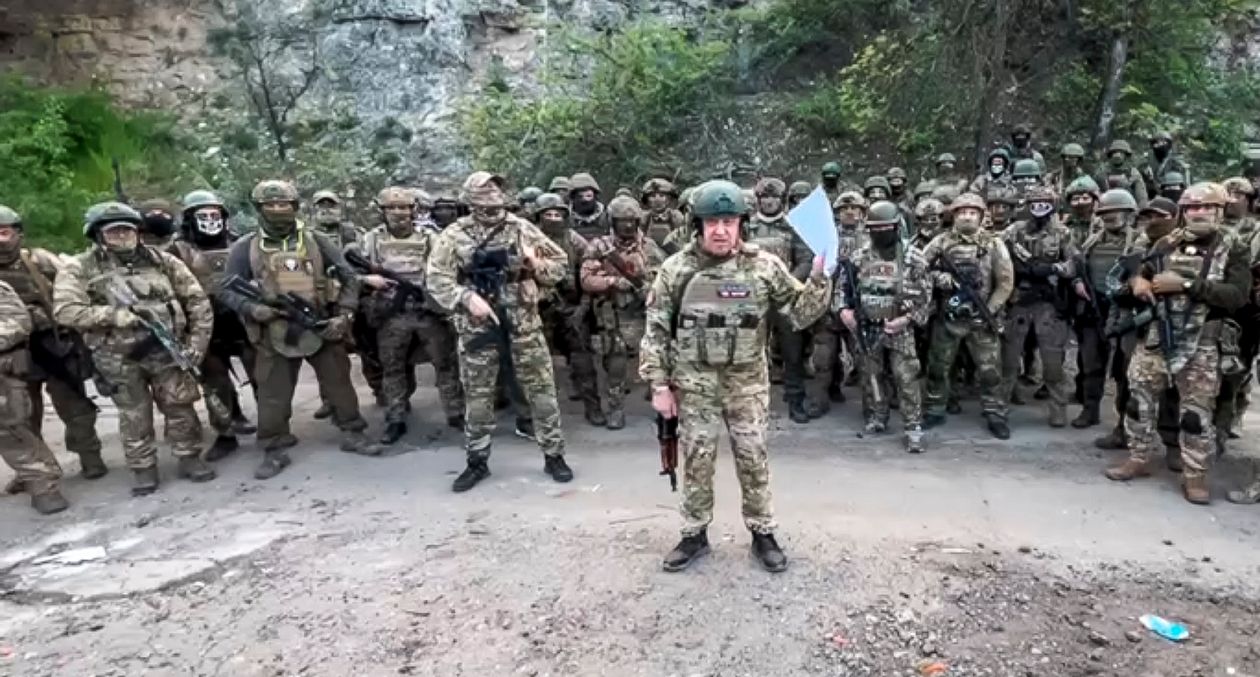 A still from a Prigozhin video shows Prigozhin with Wagner troops on May 5. He often criticized Russian military leaders. PHOTO: PRIGOZHIN PRESS SERVICE/ASSOCIATED PRESS
A still from a Prigozhin video shows Prigozhin with Wagner troops on May 5. He often criticized Russian military leaders. PHOTO: PRIGOZHIN PRESS SERVICE/ASSOCIATED PRESS
The group had also gained a foothold in sub-Saharan Africa where it traded timber, gold, cash and diamonds for providing security to leaders—an important channel of geopolitical influence for Russia.
ADVERTISEMENT
In Ukraine, Prigozhin threw his support behind Putin’s invasion, winning key battles, while hurling public criticism at Russia’s commanders for their military losses.
His social media tirades against Chief of General Staff Gen. Valery Gerasimov and Defense Minister Sergei Shoigu—combined with the successful advances of his troops in eastern Ukraine—got him noticed in Moscow and won him powerful enemies, including Patrushev.
In Prigozhin’s tirades against Shoigu, those inside the Kremlin saw Putin’s longtime tactic of keeping his subordinates divided by allowing feuds. But in the war, the warlord’s accumulation of power had made him a danger to the president.
“Everyone told Putin it was a mistake to have a parallel army,” said one former Kremlin official, who had at times worked with both Putin and Patrushev. “When he spits in the face of the military leadership every day—you have yourself a problem.”
Patrushev began to warn Putin about Prigozhin during the summer months of 2022. But the warnings fell on deaf ears while Wagner made progress on the battlefield.
That changed when Prigozhin called Putin and complained rudely about his lack of supplies, said the former Russian intelligence officer, who maintains ties to people close to Putin and his spy chief. Prigozhin needed guns and bullets and his men were dying in large numbers.
The call happened in October with others in the office, the former agent said, including Patrushev, who heard the former caterer scold the president. Later Patrushev would use the call as a reason Putin should distance himself: The warlord had become dangerous, with no respect for the Kremlin’s authority.
ADVERTISEMENT
By December it was clear Patrushev had won. Even as Prigozhin publicly railed against the military and his lack of supplies, Putin ignored him. Calls went unanswered. By early June, the Kremlin effectively announced plans to dismantle Wagner as a fighting force in Ukraine, ordering its fighters to register with Russia’s defense ministry.
On Friday June 23, Prigozhin launched a mutiny, taking his 25,000 men and tanks from the battlefield in Ukraine and marched them toward the southern city of Rostov-on-Don to take the Russian armed forces’ southern military district headquarters. The plan, on what he called his “march of justice,” was to confront Gerasimov and Shoigu, who had been there for meetings but escaped before Prigozhin arrived.
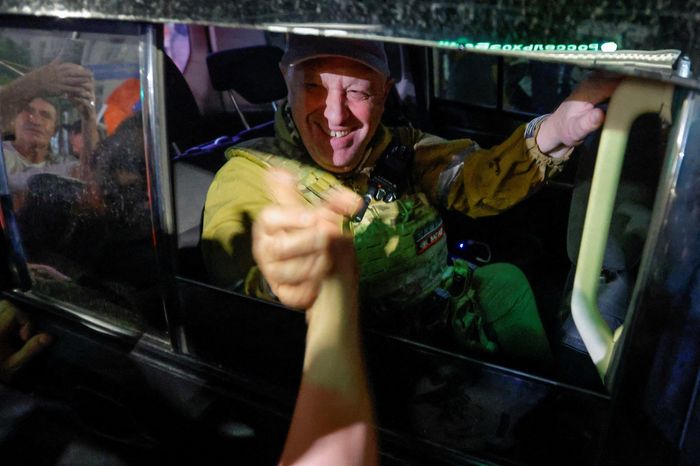 Prigozhin during his mutiny on June 24. PHOTO: ALEXANDER ERMOCHENKO/REUTERS
Prigozhin during his mutiny on June 24. PHOTO: ALEXANDER ERMOCHENKO/REUTERS
Prigozhin sent another column of tanks and soldiers toward Moscow.
With Putin at a villa far outside of the city, Patrushev took over, organizing a flurry of phone calls to persuade Prigozhin to stand down, according to Western intelligence assessments and the former Russian intelligence officer.
Patrushev asked officers sympathetic to Prigozhin to try to get through to him. Five calls to Prigozhin from the Kremlin went unanswered. He also looked for mediators, and calls were made to the governments of Kazakhstan and Belarus, both members of a Russian-led military alliance made up of former Soviet states.
The call to Kazakhstan was insurance against a worst-case scenario. The year before, Russia had sent it troops to restore order after violent riots broke out. The hope now was Kazakhstan would return the favor if the Russian military couldn’t hold the rogue army back, said a Western intelligence official and the former Russian intelligence officer. But president Kassym Jomart Tokayev declined, having distanced himself after Russia’s invasion of Ukraine.
ADVERTISEMENT
In the end, the president of Belarus, Alexander Lukashenko, said in a public statement at the time he agreed to help, calling Prigozhin multiple times over the course of more than six hours and ferrying messages between the warlord and Moscow. Ultimately, he delivered an offer hashed out by Patrushev: If Prigozhin turned his troops around, his men would be allowed to decamp to Belarus.
Lukashenko had several rounds of talks with Prigozhin, as well as Putin, his press service said in a statement to the Journal. “The talks delivered success,” the statement said.
In a late morning television appearance, Putin called Prigozhin and the Wagner leadership traitors, helping persuade him to take the offer, which included retaining control of his overseas operations, such as those in Africa.
While Prigozhin and his fighters hadn’t encountered active resistance from the military, most units they encountered weren’t joining them either. By early Saturday evening, Prigozhin’s mutiny had come to an end.
Prigozhin’s fighters who were heading toward Moscow stopped and some began marching toward camps putatively prepared for them in Belarus. Prigozhin himself disappeared from social media.
For the rest of the summer, an uneasiness settled on Moscow. Few in the Kremlin believed that Prigozhin would get away with an armed mutiny with no consequences.
Patrushev would prove them right.
ADVERTISEMENT
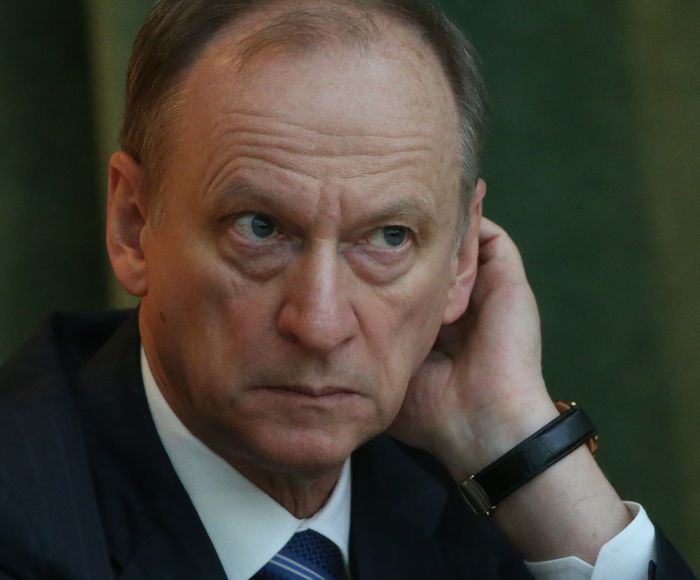 Patrushev in 2015. He is Putin’s oldest ally and confidant. PHOTO: SASHA MORDOVETS/GETTY IMAGES
Patrushev in 2015. He is Putin’s oldest ally and confidant. PHOTO: SASHA MORDOVETS/GETTY IMAGES
“He knew he had enemies and that something could happen to him, but as far as he was concerned he was abiding by the deal,” Shugaley said.
Mowatt-Larssen, the former CIA station chief, said that Prigozhin might have appeared to be free, when in fact he was being closely watched. His mutiny had exposed a deep rift in Putin’s system of running the country, as well as dissatisfaction in the military, which had done little to oppose his march, he said.
“You can see what Putin’s plan was—to keep the dead man walking so they could continue to find out what happened,” he said, meaning the Kremlin was looking for Prigozhin’s collaborators.
In the beginning of August, as most of Moscow went on vacation, Patrushev, in his office in central Moscow, gave orders to his assistant to proceed in shaping an operation to dispose of Prigozhin, said the former Russian intelligence officer. Putin was later shown the plans and didn’t object, Western intelligence agencies said.
Several weeks later, following his tour through Africa, Prigozhin was waiting at a Moscow airport while safety inspectors finished a check on the plane. It was during this delay that a small bomb was placed under the wing, said Western intelligence officials.
The jet departed after 5 p.m. and reached an altitude of 28,000 feet. But after more than half an hour, the aircraft swiftly lost altitude and crashed near the village of Kuzhenkino. Witness videos show that after an explosion, a jet with a detached wing fell from the sky.
Within days, Russian media reported that DNA tests confirmed Prigozhin had died in the crash. Nine others were killed with him, including the Wagner group’s commander, Dmitry Utkin, another Wagner associate, two pilots and a 39-year-old flight attendant.
Warren P. Strobel and Max Colchester contributed to this article.
Write to Thomas Grove at thomas.grove@wsj.com, Alan Cullison at alan.cullison@wsj.com and Bojan Pancevski at bojan.pancevski@wsj.com
When the jet finally left, it climbed for about 30 minutes to 28,000 feet, before the wing blew apart, sending the aircraft spiraling to the ground. All 10 people were killed, including Prigozhin, the owner of the Wagner paramilitary group.
The assassination of the warlord was two months in the making and approved by Russian President Vladimir Putin’s oldest ally and confidant, an ex-spy named Nikolai Patrushev, according to Western intelligence officials and a former Russian intelligence officer. The role of Patrushev as the driver of the plan to kill Prigozhin hasn’t been previously reported.
The Kremlin has denied involvement in Prigozhin’s death, and Putin offered the closest thing to an official explanation for the plane’s fiery crash, suggesting a hand grenade had detonated onboard.
None of that was true.
Hours after the incident, a European involved in intelligence gathering who maintained a backchannel of communication with the Kremlin and saw news of the crash asked an official there what had happened.
“He had to be removed,” the Kremlin official responded without hesitation.
ADVERTISEMENT
Collision course
Patrushev had warned Putin for a long time that Moscow’s reliance on Wagner in Ukraine was giving Prigozhin too much political and military clout that was increasingly threatening the Kremlin.With tens of thousands of troops and lucrative gold, timber and diamond operations in Africa, Prigozhin managed a multibillion-dollar empire overseas. But back in Russia and on the battlefield in Ukraine, his public confrontations with the military’s top brass over weapons and supplies had put him on a collision course with the Kremlin.
When that boiled over into an outright mutiny in late June against Russia’s military commanders—with an armed march on Moscow by some of Wagner’s 25,000 fighters and tanks—Patrushev stepped in to ward off the biggest challenge yet to Putin’s more than two-decade rule. He also saw an opportunity to eliminate Prigozhin for good.
In interviews with Western intelligence agencies, former U.S. and Russian security and intelligence officials, and former Kremlin officials, The Wall Street Journal unearthed new details about the mutiny and murder of Russia’s most powerful warlord and the previously unknown role of Patrushev in reasserting Putin’s authority over an increasingly unstable Russia.
Through the power of state-controlled media and his own persona, Putin has unsettled the West with his image as a determined adversary who rules Russia alone. In fact, he is kept in power by a vast bureaucracy that has proven durable through deepening hostilities with the West and rising domestic divisions over the botched invasion of Ukraine.
Controlling the levers of that machine is Patrushev. He has climbed to the top by interpreting Putin’s policies and carrying out his orders. Throughout Putin’s reign, he has expanded Russia’s security services and terrorized its enemies with assassinations at home and abroad. More recently his profile has grown, backing Russia’s invasion, and his son Dmitry, a former banker, has been appointed agriculture minister and is touted by some as a potential successor to Putin.
ADVERTISEMENT
Patrushev’s handling of Prigozhin has helped Putin claim control ahead of the presidential elections next year.
Former colleagues of Patrushev describe him as a sober bureaucrat who, like Putin, spurns the media, relying on daily readouts about the world from Russia’s security services. Like Putin, he joined the spy services in the 1970s, and stuck with the service through the collapse of the Soviet Union when other officers flocked to more lucrative jobs in Russia’s nascent private sector.
Patrushev, 72, sees Russia locked in a struggle with the U.S., which he has said wants to steal Russia’s oil and minerals. He salts conspiracy theories into speeches and interviews. Earlier this year, he told Russia’s Izvestia newspaper that the U.S. is plotting to take over Russia because a massive volcanic eruption in Wyoming could soon make it uninhabitable.
His role in some of the darker chapters of Putin’s presidency underscores the often deadly consequences for anyone who falls afoul of the Kremlin.
Russian officials and Patrushev didn’t respond to requests for comment.
U.S. officials said soon after Prigozhin’s death that preliminary government assessments found the crash was the result of an assassination plot.
Rise of the spy
In photos of him and Putin, Patrushev is a figure in the background, mostly unnoticed in an unremarkable dark suit. Daily, he travels in a Russian-made Aurus limousine to his spartan office in the presidential administration complex, steps away from the Kremlin, said former Kremlin officials. His phone calls are usually encrypted.ADVERTISEMENT
Patrushev plunged into the world of spycraft at an early age in the Soviet city of Leningrad, now St. Petersburg. Recruited into the KGB after earning a degree in engineering, he attended the spy service’s academy in Minsk. He soon worked in counterespionage and as an officer responsible for security in a region bordering Finland.
With Putin, he suffered the collapse of the Soviet Union and the decline of the security services while the government of President Boris Yeltsin attempted to introduce Western-style economic reforms. When Yeltsin appointed Putin in 1999 to be prime minister, Putin recommended Patrushev as his replacement to lead the new version of the KGB, the FSB.
Putin’s rise to the presidency the following year buttressed Patrushev’s authority. The men were linked by common origins and convictions that only strong security services could make Russia strong.
As head of the spy agency, Patrushev began to reinvent the organization and referred to it in an interview at the time with the Russian newspaper Moskovsky Komsomolets as Russia’s “new nobility.”
It was a sensitive moment for the new president, and Patrushev showed he was ready to help. In his first year as president, Putin was threatened by revelations that he had served as an adviser to a real-estate company being investigated in Europe for money laundering. Patrushev traveled to Ukraine to take possession of damaging evidence from that country’s security service, according to audiotapes leaked from the Ukraine president’s office. Parts of the tapes were later verified by the U.S. government. Putin denied any wrongdoing, and the scandal later died down.
Patrushev soon signaled that traitors to the Kremlin would suffer. In 2006, Russia passed a law effectively legalizing extrajudicial killings of Russians abroad deemed terrorists or extremists. Months later, a former FSB agent, Alexander Litvinenko, who had fled to London and wrote about Putin and his own work as a spy, was killed by a dose of a radioactive substance in his tea. A British judge said that Patrushev probably approved the murder.
ADVERTISEMENT
As FSB director, Patrushev had hoped to foster cooperation with the West’s own antiterror efforts, which were then in full bloom in the U.S. after the attacks on New York and Washington in 2001. But Litvinenko’s poisoning, which contaminated a sushi restaurant in downtown London, began to sow questions about any cooperation. The assassination was one of the first of more mysterious killings of Russian émigrés in Europe and the Middle East that Western officials suspected were linked to Moscow.
When Russia convened an international counterterrorism conference in the city of Khabarovsk in 2007, the CIA declined to send any high-ranking officials, instead offering a lower-profile group headed by a former CIA station chief, Rolf Mowatt-Larssen. Mowatt-Larssen said Patrushev took him aside to say he was offended. “He said ‘Please take this message back to the CIA,’” Mowatt-Larssen said. “‘You aren’t taking us seriously.’”
In 2008, Putin promoted Patrushev to secretary of Russia’s national security council, a post that confers little formal power. But Patrushev’s personal gravitas, his proximity to Putin and his role as de facto head of its security services for more than two decades has made him the second most powerful person in Russia.
His new role also gave him the mandate to strengthen Russia’s ties abroad. Soon he was acting as a kind of hybrid intelligence official and diplomat, visiting some of the world’s most powerful leaders. The feverish pace of Patrushev’s travel schedule contrasted with how little was actually known about his meetings.
‘We know who our enemies are’
One of the few public glimpses into his activities was in 2016 when he went to clean up a mess left after the failure of a political interference operation in the tiny Balkan nation of Montenegro. Russia’s military intelligence had tried to cause unrest to prevent it from joining NATO.The operation, run from neighboring Serbia, failed, and the Russian agents were publicly exposed, causing fallout for Moscow’s allies in the region. Patrushev traveled to Serbia to reassure the government and brought the operatives home. Montenegro joined NATO a year later.
ADVERTISEMENT
Most of his work was done in the shadows. His plane was spotted in Oman in 2020 at the same time that Ukrainian President Volodymyr Zelensky was there, prompting accusations in Ukraine that the two had held a secret meeting. Both Zelensky and the Kremlin denied it.
Separately, in the run-up to Russia’s invasion of Ukraine, Patrushev’s plane also appeared in Jakarta at the same time as a visit by U.S. Secretary of State Antony Blinken, who was rolling out the White House strategy for regulating the contested Indian and Pacific Ocean region. The U.S. and Moscow each issued statements that no meeting took place.
Earlier, as indications grew of warming ties between Moscow and Beijing, the U.S. tried to talk the Kremlin back from an alliance with China. During the Trump administration, top White House officials met with Patrushev in Geneva to discuss prisoner exchanges and an extension of an arms control agreement.
A White House specialist on China, Matthew Pottinger, unveiled historical maps of Russian territories claimed by Beijing meant to underscore the threat China posed to Moscow. Patrushev listened patiently and then scoffed. “We know who our enemies are,” he said, according to one U.S. official who attended the meeting.
A former senior White House official said Patrushev has been a key conduit between Moscow and Beijing. “If Putin had been deposed or killed earlier this year by Wagner Group, I suspect Beijing would have made efforts to install Patrushev as Putin’s replacement,” the former official said.
John Bolton, who met with Patrushev numerous times as national security adviser to former President Donald Trump, said that Patrushev was always professional, never raising his voice in negotiations or showing much interest in small talk.
Bolton said he got a taste of anger only once, during a meeting in 2019, when their conversation turned to Ukraine. “We got a 20 minute oration about Ukraine and the history of it,” said Bolton. “It was very emotional and uncharacteristic for him.”
ADVERTISEMENT
Patrushev would become one the biggest defenders of the Ukraine invasion.
Russian expectations were disappointed in the first days of the conflict in February 2022. By the fall of last year, Russian forces were crumbling in the face of Ukrainian offensives in the south and north of the country, with tens of thousands of casualties.
The Kremlin called on Prigozhin and his Wagner fighters to buttress Russia’s failing war effort with his paramilitary group. Prigozhin’s rapid rise would soon worry Patrushev.
March to Moscow
A former prison convict and hot-dog vendor from Putin’s hometown of St. Petersburg, Prigozhin became a caterer for Putin and used his contacts to build a sprawling private military company. Over the past decade it fought wars in Ukraine, Syria and North Africa for the Kremlin.The group had also gained a foothold in sub-Saharan Africa where it traded timber, gold, cash and diamonds for providing security to leaders—an important channel of geopolitical influence for Russia.
ADVERTISEMENT
In Ukraine, Prigozhin threw his support behind Putin’s invasion, winning key battles, while hurling public criticism at Russia’s commanders for their military losses.
His social media tirades against Chief of General Staff Gen. Valery Gerasimov and Defense Minister Sergei Shoigu—combined with the successful advances of his troops in eastern Ukraine—got him noticed in Moscow and won him powerful enemies, including Patrushev.
In Prigozhin’s tirades against Shoigu, those inside the Kremlin saw Putin’s longtime tactic of keeping his subordinates divided by allowing feuds. But in the war, the warlord’s accumulation of power had made him a danger to the president.
“Everyone told Putin it was a mistake to have a parallel army,” said one former Kremlin official, who had at times worked with both Putin and Patrushev. “When he spits in the face of the military leadership every day—you have yourself a problem.”
Patrushev began to warn Putin about Prigozhin during the summer months of 2022. But the warnings fell on deaf ears while Wagner made progress on the battlefield.
That changed when Prigozhin called Putin and complained rudely about his lack of supplies, said the former Russian intelligence officer, who maintains ties to people close to Putin and his spy chief. Prigozhin needed guns and bullets and his men were dying in large numbers.
The call happened in October with others in the office, the former agent said, including Patrushev, who heard the former caterer scold the president. Later Patrushev would use the call as a reason Putin should distance himself: The warlord had become dangerous, with no respect for the Kremlin’s authority.
ADVERTISEMENT
By December it was clear Patrushev had won. Even as Prigozhin publicly railed against the military and his lack of supplies, Putin ignored him. Calls went unanswered. By early June, the Kremlin effectively announced plans to dismantle Wagner as a fighting force in Ukraine, ordering its fighters to register with Russia’s defense ministry.
On Friday June 23, Prigozhin launched a mutiny, taking his 25,000 men and tanks from the battlefield in Ukraine and marched them toward the southern city of Rostov-on-Don to take the Russian armed forces’ southern military district headquarters. The plan, on what he called his “march of justice,” was to confront Gerasimov and Shoigu, who had been there for meetings but escaped before Prigozhin arrived.
Prigozhin sent another column of tanks and soldiers toward Moscow.
With Putin at a villa far outside of the city, Patrushev took over, organizing a flurry of phone calls to persuade Prigozhin to stand down, according to Western intelligence assessments and the former Russian intelligence officer.
Patrushev asked officers sympathetic to Prigozhin to try to get through to him. Five calls to Prigozhin from the Kremlin went unanswered. He also looked for mediators, and calls were made to the governments of Kazakhstan and Belarus, both members of a Russian-led military alliance made up of former Soviet states.
The call to Kazakhstan was insurance against a worst-case scenario. The year before, Russia had sent it troops to restore order after violent riots broke out. The hope now was Kazakhstan would return the favor if the Russian military couldn’t hold the rogue army back, said a Western intelligence official and the former Russian intelligence officer. But president Kassym Jomart Tokayev declined, having distanced himself after Russia’s invasion of Ukraine.
ADVERTISEMENT
In the end, the president of Belarus, Alexander Lukashenko, said in a public statement at the time he agreed to help, calling Prigozhin multiple times over the course of more than six hours and ferrying messages between the warlord and Moscow. Ultimately, he delivered an offer hashed out by Patrushev: If Prigozhin turned his troops around, his men would be allowed to decamp to Belarus.
Lukashenko had several rounds of talks with Prigozhin, as well as Putin, his press service said in a statement to the Journal. “The talks delivered success,” the statement said.
In a late morning television appearance, Putin called Prigozhin and the Wagner leadership traitors, helping persuade him to take the offer, which included retaining control of his overseas operations, such as those in Africa.
While Prigozhin and his fighters hadn’t encountered active resistance from the military, most units they encountered weren’t joining them either. By early Saturday evening, Prigozhin’s mutiny had come to an end.
Prigozhin’s fighters who were heading toward Moscow stopped and some began marching toward camps putatively prepared for them in Belarus. Prigozhin himself disappeared from social media.
For the rest of the summer, an uneasiness settled on Moscow. Few in the Kremlin believed that Prigozhin would get away with an armed mutiny with no consequences.
Patrushev would prove them right.
ADVERTISEMENT
The killing
After the mutiny, the Kremlin did little publicly to limit Prigozhin’s life. He traveled to Africa to check in on his operations there. He was also allowed to continue working in St. Petersburg and around Russia, said Maksim Shugaley, who worked for Prigozhin at a think tank. But, he said, Prigozhin was wary.“He knew he had enemies and that something could happen to him, but as far as he was concerned he was abiding by the deal,” Shugaley said.
Mowatt-Larssen, the former CIA station chief, said that Prigozhin might have appeared to be free, when in fact he was being closely watched. His mutiny had exposed a deep rift in Putin’s system of running the country, as well as dissatisfaction in the military, which had done little to oppose his march, he said.
“You can see what Putin’s plan was—to keep the dead man walking so they could continue to find out what happened,” he said, meaning the Kremlin was looking for Prigozhin’s collaborators.
In the beginning of August, as most of Moscow went on vacation, Patrushev, in his office in central Moscow, gave orders to his assistant to proceed in shaping an operation to dispose of Prigozhin, said the former Russian intelligence officer. Putin was later shown the plans and didn’t object, Western intelligence agencies said.
Several weeks later, following his tour through Africa, Prigozhin was waiting at a Moscow airport while safety inspectors finished a check on the plane. It was during this delay that a small bomb was placed under the wing, said Western intelligence officials.
The jet departed after 5 p.m. and reached an altitude of 28,000 feet. But after more than half an hour, the aircraft swiftly lost altitude and crashed near the village of Kuzhenkino. Witness videos show that after an explosion, a jet with a detached wing fell from the sky.
Within days, Russian media reported that DNA tests confirmed Prigozhin had died in the crash. Nine others were killed with him, including the Wagner group’s commander, Dmitry Utkin, another Wagner associate, two pilots and a 39-year-old flight attendant.
Warren P. Strobel and Max Colchester contributed to this article.
Write to Thomas Grove at thomas.grove@wsj.com, Alan Cullison at alan.cullison@wsj.com and Bojan Pancevski at bojan.pancevski@wsj.com


